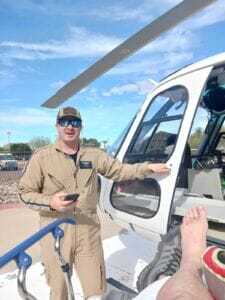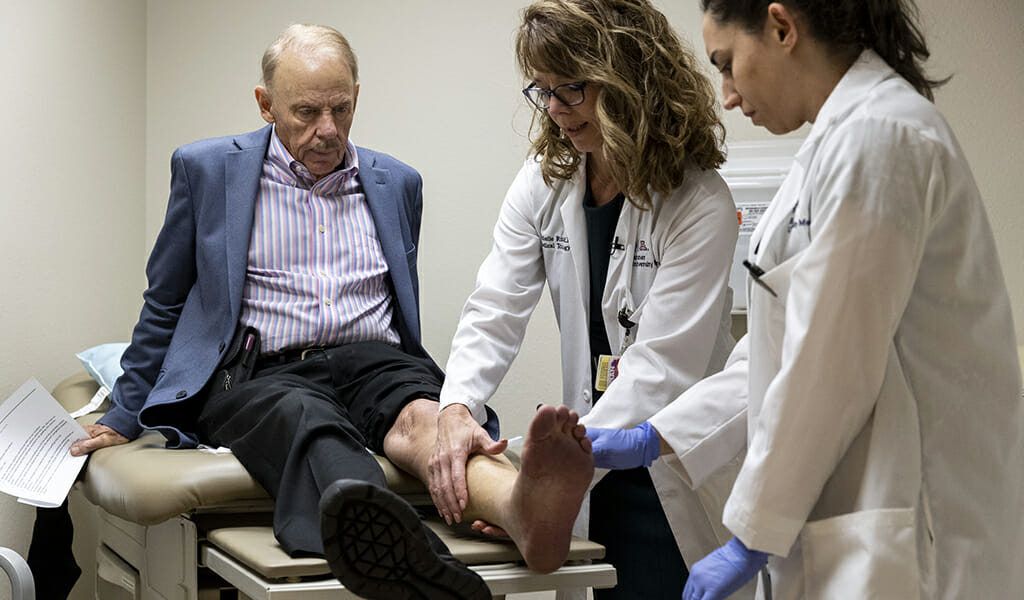A Valley man bitten by a rattlesnake received antivenom treatment while en route to the hospital aboard BannerAir – Banner Health’s hospital-based air ambulance transport. This is the first time a patient has received the treatment outside of a hospital setting.
DEEPER DIVE: Here’s where most Arizona rattlesnake removals take place
READ ALSO: 3 tips from experts as snake season strikes Arizona
Recently, Daniel Steininger was hiking with his wife at the Hawes Trail System in Mesa when he heard the snake’s rattle. Unfortunately, the 77-year-old man didn’t have time to react and was bitten on his left ankle.

A crew from Rural Metro Fire Station 857 responded after the couple called 911 and then a BannerAir helicopter crew was dispatched to their location. On board was the antivenom to treat Steininger, the first time it has been administered in a non-hospital setting in Arizona. BannerAir partnered with Rare Disease Therapeutics last August to be able to carry antivenom on its helicopters.
“BannerAir is committed to delivering the highest level of clinical excellence to the patients we serve,” said Aimee Kollat, chief flight nurse for BannerAir. “As part of our commitment to Arizona communities, we are honored and proud to be able to deliver this unique life-saving treatment in the field.”
Steininger was eventually taken to Banner – University Medical Center Phoenix where he received further evaluation and treatment for his injury. He has since been discharged and is on his way to a speedy recovery.
“Because of the quick actions of the entire staff and the EMTs in the field, my recovery has been absolutely dramatic compared to most,” Steininger said. “I’m entirely grateful to the crew here — from the emergency room, to the nurses, to the toxicologists — they are all fantastic!”
Steininger’s rattlesnake bite is not a surprise to the Banner Poison and Drug Information Center as they’ve started to see an increase in calls regarding rattlesnake and scorpion envenomation. Arizona records around 200 rattlesnake bites annually and reports more than 10,000 scorpion stings.
“If you are out hiking and are bitten by a rattlesnake, the most important thing you can do is get to a hospital as soon as possible,” said Dr. Anne-Michelle Ruha, chief of the department of medical toxicology at Banner – University Medical Center Phoenix. “In this case, BannerAir actually had the antivenom available, and the patient was able to receive treatment in less than an hour from the time of his bite, which is really impressive.”
If a rattlesnake bites you, it’s important to remain calm and call 911 for help. Even though up to 25% of rattlesnake bites are considered dry bites, in which no venom is deposited, all rattlesnake bites must be evaluated in an emergency department.
This week also marks National Poison Prevention Week.
To prevent poisonings, Banner Poison and Drug Information Center recommends the following:
· Be prepared for an emergency. Keep the national, free Poison Help phone number handy by saving the number in your mobile phone: 1-800-222-1222
· Practice safe storage habits. Always store medicines and hazardous substances away from children. Keep these substances in their original, child resistant containers.
· Read and follow all labels and directions. Review medicine and product labels before you use them, especially before giving medicine to children.
· Detect invisible threats. Have a working carbon monoxide detector in your home
If you or a loved one believe there has been exposure to any poison, medication or chemical please call the poison center immediately at 1-800-222-1222. The poison centers can assist in the evaluation and management and help determine if it is necessary to seek additional medical attention.
Call 1(800)222-1222 or 602-253-3334 (local); 24/7/365 with questions regarding this or any other poison, drug, or chemical exposure.




